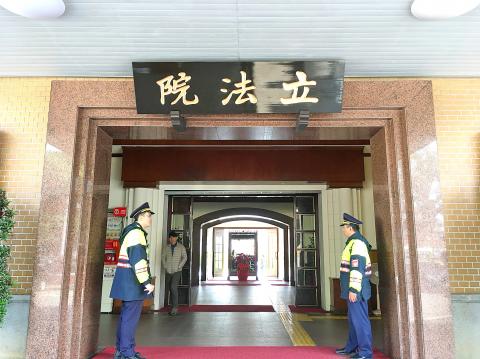A vote on an anti-infiltration bill is likely to take place at the Legislative Yuan in Taipei today after cross-caucus negotiations yesterday failed to reach a consensus.
During yesterday’s talks, which lasted about six hours, Legislative Speaker Su Jia-chyuan (蘇嘉全) said that when the bill is brought up today, each caucus would be given an opportunity to speak and to vote on it.
Chinese Nationalist Party (KMT) Vice Secretary-General Chang Hsien-yao (張顯耀) accused the Democratic Progressive Party (DPP) of rushing the procedure to manipulate the elections on Jan. 11.

Photo: Lin Liang-sheng, Taipei Times
The KMT places great importance on national security and is opposed to foreign infiltration of the Republic of China, but it opposes passage of the bill before the elections, Chang said.
“President Tsai Ing-wen’s (蔡英文) instructions to the Legislative Yuan to pass the bill on Dec. 31 are a violation of the Constitution,” he said.
“The president should be supervised by the Legislative Yuan, but she is telling the legislature to pass a major bill by a deadline,” he said.
The DPP has not put the bill to a public hearing, inspection by committee or cross-party talks, he said, adding that the scope and target of the proposed legislation were unclear.
Such legislation would cause panic and unease among more than 2 million Taiwanese working, studying or doing business in China, as well as among cross-strait exchange organizations, he said.
“Was the DPP sleeping for three years? Has it been ignoring concerns about Chinese infiltration and national security? If not, why has it waited until the last minute to push through this bill?” Chang asked.
At a campaign event in New Taipei City, DPP Chairman Cho Jung-tai (卓榮泰) said that the bill would not target innocent people or those engaged in sporting, cultural, business or other regular exchanges with China.
There is no cause for concern, Cho said, adding that he hoped people would not “make waves or foster unease.”
The bill contains 12 articles, its wording is clear, and its scope tight and carefully defined, while the legislative process surrounding its formulation and passage was transparent, Cho said.
It is needed to counter the actions of foreign forces engaging in illegal activity within the nation’s borders, he said.
Belle Yu (于美人), campaign spokeswoman for People First Party Chairman James Soong (宋楚瑜), said that while Taiwanese hope for an anti-infiltration bill to protect the nation, the current draft was worded unclearly and tries to cover too much.
The bill is too small, with only 12 articles and fewer than 1,000 words, Yu said, adding that it was “a bit sloppy.”
Too much of it has been questioned, she said, adding that the bill should be revised and its contents more clearly explained.
Regular people would worry that their actions would become illegal and that there would be no official channel through which to appeal, she said.
Additional reporting by Lai Hsiao-tung and Wu Su-wei

INVESTIGATION: The case is the latest instance of a DPP figure being implicated in an espionage network accused of allegedly leaking information to Chinese intelligence Democratic Progressive Party (DPP) member Ho Jen-chieh (何仁傑) was detained and held incommunicado yesterday on suspicion of spying for China during his tenure as assistant to then-minister of foreign affairs Joseph Wu (吳釗燮). The Taipei District Prosecutors’ Office said Ho was implicated during its investigation into alleged spying activities by former Presidential Office consultant Wu Shang-yu (吳尚雨). Prosecutors said there is reason to believe Ho breached the National Security Act (國家安全法) by leaking classified Ministry of Foreign Affairs information to Chinese intelligence. Following interrogation, prosecutors petitioned the Taipei District Court to detain Ho, citing concerns over potential collusion or tampering of evidence. The

TRADE: The premier pledged safeguards on ‘Made in Taiwan’ labeling, anti-dumping measures and stricter export controls to strengthen its position in trade talks Products labeled “made in Taiwan” must be genuinely made in Taiwan, Premier Cho Jung-tai (卓榮泰) said yesterday, vowing to enforce strict safeguards against “origin laundering” and initiate anti-dumping investigations to prevent China dumping its products in Taiwan. Cho made the remarks in a discussion session with representatives from industries in Kaohsiung. In response to the US government’s recent announcement of “reciprocal” tariffs on its trading partners, President William Lai (賴清德) and Cho last week began a series of consultations with industry leaders nationwide to gather feedback and address concerns. Taiwanese and US officials held a videoconference on Friday evening to discuss the

NEGOTIATIONS: The US response to the countermeasures and plans Taiwan presented has been positive, including boosting procurement and investment, the president said Taiwan is included in the first group for trade negotiations with the US, President William Lai (賴清德) said yesterday, as he seeks to shield Taiwanese exporters from a 32 percent tariff. In Washington, US Trade Representative Jamieson Greer said in an interview on Fox News on Thursday that he would speak to his Taiwanese and Israeli counterparts yesterday about tariffs after holding a long discussion with the Vietnamese earlier. US President Donald Trump on Wednesday postponed punishing levies on multiple trade partners, including Taiwan, for three months after trillions of US dollars were wiped off global markets. He has maintained a 10 percent

PERSONAL DATA: The implicated KMT members allegedly compiled their petitions by copying names from party lists without the consent of the people concerned Judicial authorities searched six locations yesterday and questioned six people, including one elderly Chinese Nationalist Party (KMT) member and five KMT Youth League associates, about alleged signature forgery and fraud relating to their recall efforts against two Democratic Progressive Party (DPP) legislators. After launching a probe into alleged signature forgery and related fraud in the KMT’s recall effort, prosecutors received a number of complaints, including about one petition that had 1,748 signatures of voters whose family members said they had already passed away, and also voters who said they did not approve the use of their name, Taipei Deputy Chief Prosecutor